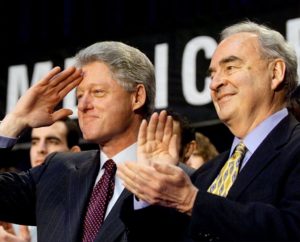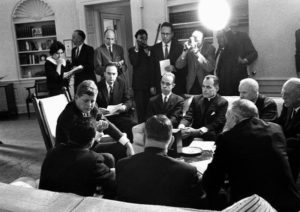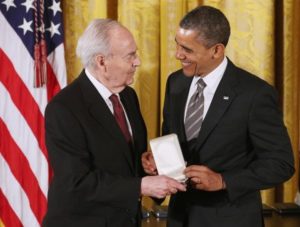New York Times: “Harris Wofford, Ex-Senator Who Pushed Volunteerism, Dies at 93”

Harris Wofford with President Bill Clinton during the first national recruitment effort for AmeriCorps volunteers at the University of Maryland in 1999. Mr. Clinton named him to lead the service organization after Mr. Wofford left the Senate.
Harris Wofford, a former United States senator from Pennsylvania whose passion for getting people involved helped create John F. Kennedy’s Peace Corps, Bill Clinton’s AmeriCorps and other service organizations and made him America’s volunteer-in-chief, died on Monday night in Washington. He was 92.
His son Daniel said his death, at a hospital, was caused by complications of a fall at Mr. Wofford’s Washington apartment, The Associated Press reported.
By the time he became a senator in May 1991, appointed after his predecessor was killed in an aircraft accident, Mr. Wofford was already 65. He had been a lawyer, an author, a professor, the president of two colleges, a special assistant to President John F. Kennedy, an adviser to the Rev. Dr. Martin Luther King Jr., chairman of the Pennsylvania Democratic Party, the state’s commissioner of labor and industry, a champion of civil rights and a leading force in America’s national and community service movement.
A month after Republican Senator H. John Heinz III died, Gov. Robert P. Casey was still searching for a replacement, having been turned down by Lee Iacocca, the chairman of Chrysler, and others. Whoever accepted would have to run in a special election in November against the United States attorney general, Dick Thornburgh, a popular former two-term governor who had signaled his intention to seek the seat.
Governor Casey turned to his old friend, Mr. Wofford, who accepted a six-month appointment to the Senate seat pending the special election. Polls showed Mr. Thornburgh with a whopping 47 percent lead, but Mr. Wofford gained steadily in a winning campaign that stressed health care and the economy, themes that resonated with voters and that would underlie Mr. Clinton’s campaign for the presidency a year later. (James Carville and Paul Begala were strategists for both campaigns, and Mr. Wofford was considered for the vice presidency, although Senator Al Gore was chosen.)
Mr. Wofford as an aide to President John F. Kennedy, sat behind and to Kennedy’s left during a meeting of the Civil Rights Commission in the White House in 1961. Among the others were Spottswood W. Robinson III, a civil rights lawyer and future federal judge, seated to Mr. Wofford’s left; and, beside him, the Rev. Theodore Hesburgh, president of the University of Notre Dame.CreditByron Rollins/Associated Press

Mr. Wofford as an aide to President John F. Kennedy, sat behind and to Kennedy’s left during a meeting of the Civil Rights Commission in the White House in 1961. Among the others were Spottswood W. Robinson III, a civil rights lawyer and future federal judge, seated to Mr. Wofford’s left; and, beside him, the Rev. Theodore Hesburgh, president of the University of Notre Dame.
Mr. Wofford served out three remaining years of Mr. Heinz’s term and was narrowly defeated in 1994 by Representative Rick Santorum, a Republican 32 years his junior. But Mr. Wofford had one thing to show for his term — the National and Community Service Act of 1993, which created AmeriCorps, the Senior Corps and Learn and Serve America, federally funded programs that have enlisted hundreds of thousands of volunteers for education, health, environmental cleanups and other public service projects.
After leaving the Senate, Mr. Wofford was named head of AmeriCorps and its parent corporation by Mr. Clinton, who counted the program as a major achievement. Mr. Wofford helped organize America’s Promise, the Alliance for Youth, a nonprofit national service organization to improve children’s lives. In 2001, after six years with AmeriCorps, he succeeded Colin Powell as chairman of America’s Promise.
Mr. Wofford’s wife, Clare (Lindgren) Wofford, whom he married in 1948 and with whom he had three children, died in 1996. In April 2016, writing in the Sunday Review section of The New York Times, Mr. Wofford disclosed his pending marriage to Matthew Charlton, 40, a designer with whom he had been living for 15 years. They married that year.
“At age 90,” Mr. Wofford wrote, “I am lucky to be in an era where the Supreme Court has strengthened what President Obama calls ‘the dignity of marriage’ by recognizing that matrimony is not based on anyone’s sexual nature, choices or dreams. It is based on love.”
In the article, Mr. Wofford did not define himself as gay, writing, “Too often, our society seeks to label people by pinning them on the wall — straight, gay or in between. I don’t categorize myself based on the gender of those I love. I had a half-century of marriage with a wonderful woman, and now am lucky for a second time to have found happiness.”
In addition to his son Daniel and Mr. Charlton, Mr. Wofford is survived by a daughter, Susanne Wofford; another son, David; a brother; a sister; and six grandchildren.

President Barack Obama, in 2012, presented Mr. Wofford with the Presidential Citizen’s Medal, the nation’s second highest civilian honor, for a lifetime of humanitarian work.
Harris Llewellyn Wofford was born in New York City on April 9, 1926, and grew up in Scarsdale, N.Y. He was precocious. When he was 10, his maternal grandmother took him out of school for six months and around the world on tramp steamers. He saw 16 countries, witnessing Mussolini’s balcony rant the night he took Italy out of the League of Nations and the ruins of Shanghai after a Japanese bombing.
Inspired by the journalist Clarence Streit’s idea of world government, a union of democracies, while a student at Scarsdale High School in 1942, Mr. Wofford founded an organization, Student Federalists, that expanded to become a 2,500-member movement; he was elected its president in 1943.
In 1944, with World War II well underway, he volunteered for the Army Air Forces but did not leave the country. He earned a bachelor’s degree from the University of Chicago in 1948 and married the former Clare Lindgren that year.
He and his wife traveled for seven months in Pakistan and India, studying with disciples of Mohandas K. Gandhi, who had recently been assassinated. They worked on a kibbutz in Israel for a year and together wrote “India Afire,” (1951), which argued for land redistribution.
In the early 1950s, Mr. Wofford studied law at Yale and historically black Howard University, receiving law degrees from both in 1954. He began practicing law in Washington and was a counsel to the United States Civil Rights Commission until 1958. He taught law at the University of Notre Dame in 1959-60 and joined the Kennedy campaign.
After the election, he became a special assistant for civil rights and helped R. Sargent Shriver found the Peace Corps, later becoming its representative in Africa and its associate director. In 1965, he joined Dr. King’s civil rights movement in the South and a voting rights march from Selma to Montgomery, Ala., and was arrested with other protesters at the 1968 Democratic National Convention in Chicago.
In an article in Politico Magazine in 2015, Mr. Wofford recalled passing a note to Dr. King as he spoke to marchers before stepping off in Selma. “First Amendment,” the note said.
“He was eloquently invoking the Bible to support the march,” Mr. Wofford wrote, “and then, glancing down at the note, he added, ‘And we march in the name of the Constitution, knowing the Constitution is on our side. The right of the people peaceably to assemble and petition the government for a redress of grievances shall not be abridged. That’s the First Amendment.’ ”
From 1966 to 1970, Mr. Wofford was president of the State University of New York College at Old Westbury (now known as SUNY Old Westbury), on Long Island, and from 1970 to 1978 he was the second male president of Bryn Mawr, the women’s college in Pennsylvania. He practiced law in Philadelphia from 1980 to 1986, when he became state Democratic chairman. He was the state’s secretary of labor and industry from 1987 to 1991.
Mr. Wofford lectured widely and wrote a memoir, “Of Kennedys and Kings: Making Sense of the Sixties,” (1980). In recent years, he worked for many service organizations, including Experience Wave, which enlists retirees to tutor in schools. An early supporter of Barack Obama’s presidential race, he introduced Mr. Obama in Philadelphia for his celebrated speech on race in America, “A More Perfect Union.”
President Obama, in 2012, awarded Mr. Wofford the Presidential Citizen’s Medal, the nation’s second highest civilian honor, for a lifetime of humanitarian work.
In an interview in 2011 with Liz Fanning, the founder and executive director of CorpsAfrica, a Peace Corps project that helps African volunteers to work in their own countries, Mr. Wofford hailed the concept of home-country volunteering, especially by students in Africa.
“There isn’t the big overseas transportation problem,” he said. “Also, in most cases, there would not be a linguistic problem, which requires a lot of investment. Money will of course be a limiting factor, but there is something special about a long journey that is part of one’s education. There should be long journeys in your life, whether in your own country or abroad.”
[Please send me what you believe Senator Wofford did for the Peace Corps, or your fond recollection of meeting and working with Harris. I’ll post them on our site. jcoyneone@gmail.com]
No comments yet.
Add your comment